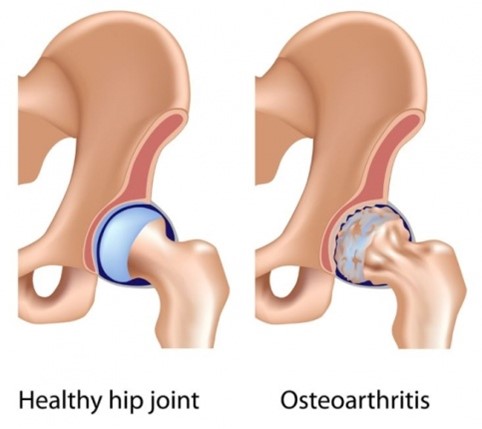
What is hip arthritis?
Hip arthritis is an age-related degenerative condition in which the articular cartilage of the is destroyed and movement is related with pain and stiffness.
How common is hip osteoarthritis?
Osteoarthritis of the hip is a common condition in modern society. It is estimated in England that 1 in 9 adults (10.9%) over the age of 45 suffer from osteoarthritis of the hip. The average total hip arthroplasty in this population ranges from 1 / 1,000 to 4 / 1,000 inhabitants over 45.
Which factors are associated with the onset of osteoarthritis?
Osteoarthritis is related to:
- The age
- Family history
- Previous injuries – fractures of the hip
- Increased body weight
- Developmental disorders of the hip (eg Congenital hip dislocation if not treated effectively after birth).
What are the symptoms of arthritis?
Depending on the degree and progression of the disease, the symptoms vary:
- Hip pain (eg groin, back of the buttocks or sometimes reflex pain in the front of the thigh). The pain is aggravated by activity and sometimes wakes the patient up at night.
- Hip stiffness with reduced range of motion. Patients find it difficult to bend over, or to put on socks and tie shoelaces.
- Mechanical symptoms (eg blockage of movement, clicking sounds or frequent squeaking.)
- Leg Length Discrepancy (the patient in advanced stages notices that the patient’s hip is shorter.
Patients will slowly notice that they cannot exercise and that the distance they walk is reduced. They often need to take short breaks.
How is the diagnosis made?
Most of the time, an examination by a specialized doctor and a simple x-ray are enough for the diagnosis. Rarely after other causes of pain with reflection in the hip are ruled out, and when the intensity of the pain is not justified by a normal x-ray, an MRI may be requested.
My family doctor said that I have hip arthritis and that I have to “run” to have surgery immediately, is that correct?
With respect to each colleague, I would personally ask for a second opinion from an Orthopedic Surgeon specialised in hip surgery to assess the degree of arthritis and advise me accordingly. Arthritis in the early stages can be treated conservatively, especially if the pain is mild and well controlled.
What does conservative treatment of arthritis involve?
There is no pharmaceutical treatment for hip arthritis that restores cartilage to its original state. But we can delay its development:
- By changing lifestyle habits (avoiding activities that aggravate pain – eg weight lifting, ladders, etc.).
- With sports activities that do not aggravate the pain (eg I avoid running and choose cycling, elliptical machine or swimming).
- It is very important to REDUCE our WEIGHT.
- Physiotherapy is very important because muscle strengthening is associated with less pain (for mechanical and biochemical reasons), better posture and better results in case of surgery.
- Physiotherapy is very important because muscle strengthening is associated with less pain (for mechanical and biochemical reasons), better posture and better results in case of surgery.
- Use of walking aids (eg hiking poles, sticks, crutches depending on the reason and age for some other time).
- Proper pain medication based on expert advice.
- In some cases we may recommend intra-articular injection as a means of reducing pain.
Who is a candidate for conservative treatment of hip arthritis?
- Patients with early signs of hip arthritis and mild symptoms.
- If Patients do not want to have surgery or they want to delay their surgery.
- If Patients are not surgical candidates for medical reasons.
Despite conservative treatment I still have hip pain, what should I do?
The final and only reliable answer to advanced hip osteoarthritis is a Total Hip Replacement. Mr. Konstantinos Evangelou, will examine you and will recommend the best treatment option that will suit your age and needs.
Image source: https://www.practicalpainmanagement.com/patient/conditions/osteoarthritis/hip-osteoarthritis/hip-osteoarthritis
